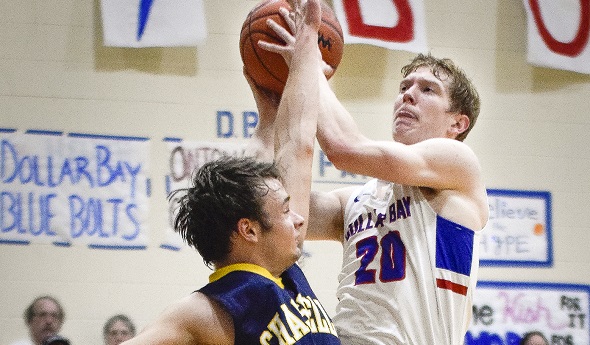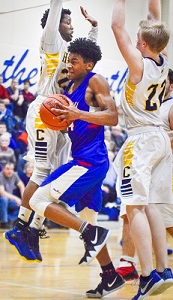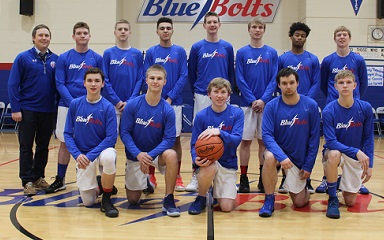
Detroit 'Longtime' Boys Coaches Down to Few
By
Tom Markowski
Special for Second Half
December 14, 2016
Gary Fralick considers himself one of the fortunate ones.
 Fralick, 66, is in his 32nd season as a head boys basketball coach. He retired from his teaching position in 2013. He started coaching at Redford Thurston in 1979, went to Royal Oak Kimball in 1984 and is in 23rd season as the head coach at Troy.
Fralick, 66, is in his 32nd season as a head boys basketball coach. He retired from his teaching position in 2013. He started coaching at Redford Thurston in 1979, went to Royal Oak Kimball in 1984 and is in 23rd season as the head coach at Troy.
Fralick might be lucky, but he is unquestionably rare. Fralick is believed to be one of three coaches in the Macomb/Oakland/Wayne area who has coached for more than 30 seasons.
There’s Dan Fife at Clarkston and Kevin Voss of Clinton Township Chippewa Valley, both of whom in their 35th seasons, all at the same school.
Another, Greg Esler at Warren DeLaSalle, is in his 30th season. He was the head coach at St. Clair Shores Lake Shore for seven seasons before going to DeLaSalle in 1994.
“We’re part of a dying breed,” Voss said.
It certainly appears so. Coaching longevity has taken on a different meaning recently. Twenty seems like a lot in these times, and in reality it is a long time. Twenty years or so ago, 20 years was normal. There’s a new normal, and 20 or 25 years isn’t it.
Many factors have contributed to this change. A person’s personal and family life often don’t coincide with the demands of coaching basketball. The responsibilities that come with coaching have increased. Some coaches say that to be an effective coach, it can be a 10- or 11-month job.
Two factors are at the forefront, and they are both financial. Coaches used to be educators as well as coaches. Yes, coaching can be viewed as teaching on the court, but at one time teaching in a classroom and coaching used to go hand in hand.
 Then there’s the subsidy coaches receive. It varies from school district to school district. Some make $4,000 a season, others can make $7,000. And it also costs money to run a program; unless the coach receives financial help from a booster club or parents, the money he or she receives begins to dwindle.
Then there’s the subsidy coaches receive. It varies from school district to school district. Some make $4,000 a season, others can make $7,000. And it also costs money to run a program; unless the coach receives financial help from a booster club or parents, the money he or she receives begins to dwindle.
But the most important factor is time.
“A tremendous amount of time is devoted to watching DVD or tapes,” Fralick said. “I know I’m dating myself with saying that. The point is, you’re watching a lot. There’s more scouting. And you don’t get paid much. Why don’t they stay as long as they used to? They get burned out. They want to spend more time with their families.
“You don’t see as many of the young coaches stay. Coaches don’t have the ambition to coach a long time. It’s not a profitable job. I don’t know what other coaches make. We used to compare what we made. Not anymore.
“Thirty years or more? I don’t see it happening. There’s the dual job thing. Things have changed. To me, it’s been a great job.”
To compensate for being away from home, Fralick brought his family with him. Sort of. He coached his son Gary, Jr., and Tim. Gary, a 1996 Troy graduate, played for his father his junior and senior seasons and Tim, a 1999 graduate, played four seasons on varsity. Fralick said he was even more fortunate to coach both on the same team (during the 1995-96 season).
Then there’s his wife, Sharon, who remains the scorekeeper.
“I’ve always had a passion for coaching and teaching,” Fralick said. “I love the game of basketball. I love the kids. There’s never a dull moment. It’s been a great ride.”
Vito Jordan has been around basketball all of his life. His father, Venias Jordan, was the boys head varsity coach at Detroit Mackenzie and Detroit Mumford before stepping down as a head coach only to return to the bench assisting his son the last six seasons.
Vito Jordan, 31, became a head coach at Detroit Osborn when he was 24. He started his coaching career the year before as an assistant to Henry Washington at Macomb College. Jordan went to Detroit Community after one season at Osborn and guided Community to its only MHSAA Finals appearance (Class B, 2013). He’s now in his fourth season as the head coach at Detroit Renaissance.
“I followed my father all of my life,” Jordan said. “I knew what I wanted to do when I was in college (Alma College). This is what I want to do the rest of my life.”
It’s different in Detroit. Schools close. Job titles change. Jordan, for instance, teaches at the Academy of Warren, a middle school in Detroit. It’s a charter school, not within the Detroit Public School system, therefore he receives his pay from two separate school systems (Renaissance is in the DPS).
There is a distinction. In some school systems coaches will receive a percentage – let’s say for argument sake, 10 percent – of their teaching salary to coach. Let’s say a person makes $60,000 a year to teach. He or she would then receive $6,000 to coach. If you coach two sports, that’s $12,000.
 Jordan is not privy to such a contract. Each job is separate. Jordan loves to coach, and he understands he must be a teacher to earn a decent living, and he’s content to continue on the path he is following. But he also knows that to make a good salary just coaching one must move on to the collegiate level like others have done.
Jordan is not privy to such a contract. Each job is separate. Jordan loves to coach, and he understands he must be a teacher to earn a decent living, and he’s content to continue on the path he is following. But he also knows that to make a good salary just coaching one must move on to the collegiate level like others have done.
“When there were coaches like my dad, Perry Watson (Detroit Southwestern), Johnny Goston (Detroit Pershing) and others, they all worked in the (Detroit Public) school system. Everyone was teaching. That was your career. None of them had aspirations of being a college coach. Not even Watson. Now everyone isn’t in the teaching profession. Maybe they do have a degree and maybe they don’t. The point is, most aren’t teachers. I can count on one hand those (in Detroit) who have their teaching certificate and coach.”
Jordan noted such successful PSL coaches like Derrick McDowell, Steve Hall and Robert Murphy who left high school to pursue a coaching career in college. Murphy guided Detroit Crockett to the Class B title in 2001 and is now the head coach at Eastern Michigan. McDowell has had two stints as a collegiate assistant coach, most recently at EMU. He’s since returned to coach at Detroit Western. Hall coached Detroit Rogers to three consecutive Class D titles (2003-05) before going to Duquesne University and Youngstown State as an assistant coach. Hall returned to Detroit last season and is in his second season as head coach at Detroit Cass Tech.
Jordan said they left high school to challenge themselves professionally, among other considerations. Voss said there are variables that influence how long a person lasts, in one school district or in coaching in general, that didn’t exist 20 years ago.
“Athletics have become pervasive in high school,” he said. “The whole booster situation you find in college is here. You can be winning but not winning enough. It’s a trickle down affect.
“Coaches complain about parents. Parents complain about playing time. High school sports is not as pure as it once was. Winning is way more important now. Now a coach comes in with a three-year window. You can have one or two down years, and the third you’d better win.
“Then there’s the pressure on your family. I’ve been lucky. My wife and I have had the players over for team dinners. We create a family atmosphere. It’s a change of society. I don’t envy the young coaches coming in.”
Community involvement has always been a priority for Voss. To keep a hand on the pulse, Voss heads the elementary basketball program within the Chippewa Valley school district. Games are held on Saturdays, and approximately 750 students take part.
“You have to have the right fit,” he said. “I’m in the right spot. You coach for different reasons when you get older. I’m enjoying the game. There’s a different level of satisfaction.”
 Tom Markowski is a columnist and directs website coverage for the State Champs! Sports Network. He previously covered primarily high school sports for the The Detroit News from 1984-2014, focusing on the Detroit area and contributing to statewide coverage of football and basketball. Contact him at [email protected] with story ideas for Oakland, Macomb and Wayne counties.
Tom Markowski is a columnist and directs website coverage for the State Champs! Sports Network. He previously covered primarily high school sports for the The Detroit News from 1984-2014, focusing on the Detroit area and contributing to statewide coverage of football and basketball. Contact him at [email protected] with story ideas for Oakland, Macomb and Wayne counties.
PHOTOS: (Top) Troy boys basketball coach Gary Fralick, left, is in his 32nd season coaching. (Middle) Detroit Renaissance boys coach Vito Jordan is following in the coaching footsteps of his father, Venias. (Below) Chippewa Valley boys coach Kevin Voss, left, is in his 35th season at his school. (Top and below photos courtesy of C&G Newspapers; middle photo courtesy of Detroit Public School League.)

Dollar Bay Adding to UP's D Dominance
By
John Vrancic
Special for MHSAA.com
March 6, 2018
DOLLAR BAY — Small school. Huge tradition.
 That’s pretty much the way it is with the boys basketball program at Dollar Bay, a high school of 100 students in this tiny community in the Keweenaw Peninsula.
That’s pretty much the way it is with the boys basketball program at Dollar Bay, a high school of 100 students in this tiny community in the Keweenaw Peninsula.
Dollar Bay completed a perfect regular season Thursday night with a 70-59 victory at Painesdale Jeffers and opened District play Monday with a 47-24 win over Chassell in Class D.
The Blue Bolts (21-0) hope to go deeper into this year’s tournament and next host Baraga in a Wednesday District Semifinal.
A year ago, they reached the Regional opener at Negaunee where they dropped a 75-73 decision to Powers North Central. The Jets then went on to capture their third consecutive Class D title.
“The biggest thing I took from that game is what we can do as a team,” said senior forward Jaden Janke, an all-Upper Peninsula Class D second-team pick last season. “That got us excited for this season. It made us want to work that much harder.”
Senior guard Devin Schmitz, an all-U.P. Class D first-team selection, had similar thoughts.
“We wanted to show we had good Class D teams up here,” he said. “We didn’t have Brandon (Thompson) for that game. Just having all the guys coming back made us excited for this season.”
If the Blue Bolts win the District, they would be shooting for the school’s first Regional crown since 1979.
 “To have a successful program at Dollar Bay, it has to start from the ground up,” said coach Jesse Kentala. “The kids love basketball and play it on their days off. It’s really a joy being around these guys every day. In a small community, you get to know the families real well. There’s a lot of basketball history here.”
“To have a successful program at Dollar Bay, it has to start from the ground up,” said coach Jesse Kentala. “The kids love basketball and play it on their days off. It’s really a joy being around these guys every day. In a small community, you get to know the families real well. There’s a lot of basketball history here.”
Pete Dix, a 1994 graduate, holds the all-time career scoring record at Dollar Bay with 1,556 points.
Schmitz scored 30 at Painesdale on Thursday, running his career total to 1,537. But Kentala said the players have always put the team before their personal goals.
“I’ve been coaching for 11 years and these are some of the most competitive practices I’ve seen,” he added. “The strength of our team is we have all five guys working together. This is the most unselfish group of guys I ever coached. For them it’s all about sharing the ball.”
“Our second unit is also real good,” Schmitz added. “Having these guys to practice with helps the starters. It’s kind of like playing with your little brother. They’re going to beat you sometimes.”
Dollar Bay already has some experience playing on a big stage this season. Last month it earned a 51-42 victory over Ewen-Trout Creek in front of a crowd of nearly 3,300 at nearby Michigan Tech.
“We were originally scheduled for Tuesday (Feb. 6) at our place, then we changed it to Wednesday night because nothing else was going on,” said Kentala. “We thought they would draw 1,000-1,500 people. None of us expected that kind of atmosphere. They were at capacity. There were people sitting on the hardwood. That might have been the biggest attendance for a jayvee game in the U.P.”
The contest was heavily promoted by Houghton Daily Mining Gazette sports editor Bryce Derouin and got media attention statewide.
“Bryce promoted the game real well,” said Kentala. “We had two real good basketball teams, programs that have had success for years. I think it was great for both programs.
 "Moving the game to Tech is a decision we’ll never regret, and that’s something the kids will remember for the rest of their lives. I even talked to a writer from the Detroit Free Press who did a small article on our team. You can’t help but chuckle when you think about it.”
"Moving the game to Tech is a decision we’ll never regret, and that’s something the kids will remember for the rest of their lives. I even talked to a writer from the Detroit Free Press who did a small article on our team. You can’t help but chuckle when you think about it.”
What was it like playing in front of so many fans?
“It was real exciting,” said Schmitz. “We never played in front of that many people before. It was very loud. We couldn’t hear the coaches. When we went out and saw that many people, we said, ‘This is going to be fun.’ It made us want to dunk before the officials came to the floor. We could feel the building shake. We were lucky to experience that.”
Dollar Bay had a close call two nights later, edging Ontonagon 62-61 on its home floor.
“The week before, (the Ewen-Trout Creek game was) all people were talking about,” said Janke. “We’re trying not to make that game our peak. It was exciting to play at Tech, but we were glad to be on our home floor. Ontonagon has a good team. They’re not to be taken lightly.”
PHOTOS: (Top) Dollar Bay's Devin Schmitz goes up for a layup during Monday’s District win over Chassell. (Middle) Dollar Bay's Jacob Iacono drives to the basket. (Below) This season’s Dollar Bay boys basketball team, after its win Monday. (Top and middle photos courtesy of Bryce Derouin/Houghton Daily Mining Gazette. Below photo courtesy of the Dollar Bay athletic department.)

